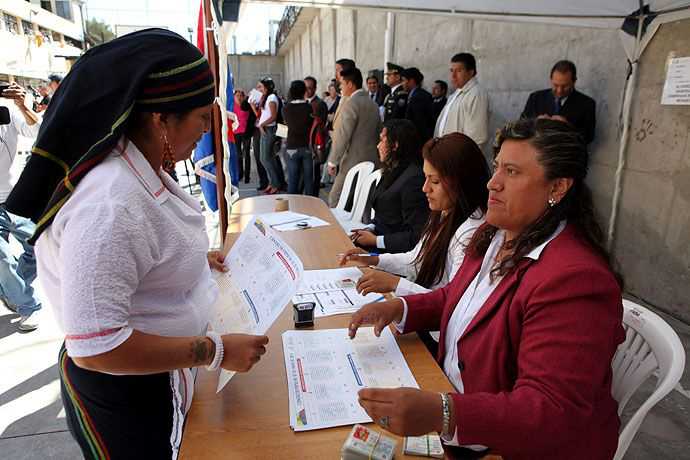 The referendum on 7 May was a celebration of democracy in which the Ecuadorian people reiterated their continued support for the revolutionary project called the Citizens’ Revolution, led by President Rafael Correa. The population were asked to vote on ten proposals from the government:
The referendum on 7 May was a celebration of democracy in which the Ecuadorian people reiterated their continued support for the revolutionary project called the Citizens’ Revolution, led by President Rafael Correa. The population were asked to vote on ten proposals from the government:
1: Preventing manipulation of the legal process by lawyers (of wealthy clients) and judges who delay a defendant’s trial date in order to secure their release under constitutional guarantees that anyone not tried within one year must be released.
2: Standardising the pre-trial treatment of defendants according to the charges against them, so that only those accused of serious crimes will be detained in custody.
3: Prohibiting private banks from owning companies (or shares in companies) outside the financial sector and private media companies from entering non-media ventures.
4: Creating a transitional Technical Council of the judiciary with one member appointed by the government, another by the National Assembly, and a third by the Office of Transparency and Social Control to overhaul the judicial system within 18 months.
5: Expanding the Council of the Judiciary to include delegates from non-judiciary branches of the state.
6: Criminalising the illegal acquisition of wealth by individuals in the private sector.
7: Banning casinos and gambling in general.
8: Banning the killing of animals for entertainment (bullfighting and cockfighting).
9: Creating a media regulation council to monitor violent, explicitly sexual or discriminatory content in broadcast and print media.
10: Criminalising employers who do not register their employees with the Social Security Institute.
The government won the referendum with 47% of the votes, against an opposition (41%) that has no proposals and whose sole aim is to destroy the Citizens’ Revolution and expel the President at any cost.
The voting ran smoothly, at home and abroad; Correa has given Ecuadorian emigrants the right to vote from overseas. However, the opposition intentionally slowed the voting count down in the more densely populated areas, where support for the Citizens’ Revolution is stronger, then, releasing the early results of the areas they held to the print and broadcast media, they announced a technical draw. Their intention was to then claim electoral fraud when the national results were announced, undermining the results of the popular vote. Their plans were exposed by President Correa at a press conference before they could succeed.
The popular consultation attempted to break a blockade established by the political elites, institutions and bureaucracies which are the legacy of the traditional corrupt political party-system. The opposition’s refusal to recognise the results of the referendum puts the unity of the country at risk. The task now will be to deepen and extend the Citizens’ Revolution.
The Movement of Ecuadorians in the UK (MERU) worked with the Ecuadorian Consulate in London to enrol and mobilise Ecuadorian citizens in Britain to vote. We achieved a 43% turnout and a 56% approval for the referendum questions, the highest recorded attendance level outside of Ecuador. This satisfactory result reflects ten months of work and commitment during which time we nearly doubled the electoral roll of Ecuadorians here, allowing more people to be actors and protagonists of their destiny.
Diego Alarcon,
Movement of Ecuadorians in the UK (MERU)




